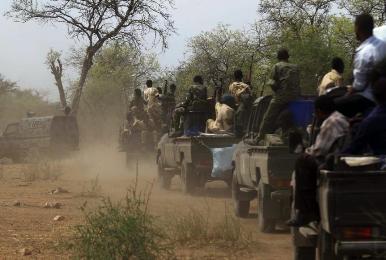South Sudan rebels say government forces are continuing with offensive
March 25, 2015 (BENTIU-MAYO) – Rebel forces loyal to former vice-president Riek Machar said government troops and their foreign allies have continued with their dry season offensive against opposition-held positions in the two oil-rich states of Upper Nile and Unity in violation of a ceasefire agreement.

Captain Paul Malith Koang, opposition spokesperson in Western bank of Upper Nile state, told Sudan Tribune by phone that forces loyal to president Salva Kiir had launched multiple attacks with with the aim of capturing more territory.
He said government troops had been driven back from Khor-Athuoy to Wedakona town after attacking rebel positions about 10am (local time) on Wednesday.
Koang has accused the government of failing to implement a cessation of hostilities agreement signed by both warring parties on 23 January 2014.
Renewed fighting was also reported in Unity state capital Bentiu on Monday and Tuesday, with pro-government troops claiming to have regained more ground to the south of Bentiu before advancing to the rebel stronghold of Nhialdiu payam (district).
However, rebels dismissed the claims, saying government troops had been repulsed from Bentiu and Rubkotna county.
Maj. Weirial Puok Baluang, a press secretary for Unity state’s military governor, told Sudan Tribune had pushed back forces from the South Sudanese army (SPLA), inflicting heavy losses.
“Our forces have repulsed [a] provocation by pro-government [troops] on Wednesday
to [the] main capital, Bentiu, and our forces are still chasing them inside the state capital,” Baluang said in an interview by satellite phone.
He claimed at least 10 government soldiers were killed and another six captured alive on Wednesday, a claim Sudan Tribune has not been able to independently verify.
Direct talks between the government and the country’s rebel faction recently stalled and there is still no resolution on the contentious issue of power-sharing.
Opposition forces, who are predominantly from Machar’s Nuer ethnic group, claim they have been fighting against national and foreign troops, as well as local militia allies and Sudanese rebels who allegedly back president Kiir’s Dinka ethnic group and allies.
Upper Nile region, which is the richest part of South Sudan with huge deposits of oil, remains a rebel stronghold and has been the scene of fierce fighting between the rival forces for the past 14 months over control of strategic locations, including oilfields.
Observers said current political differences have increasingly transformed into tribal conflicts, with the Juba administration seemingly comfortable with fighting the war far from the Bahr el Ghazal and Equatoria regions, where both Kiir and his deputy, James Wani Igga, hail from respectively.
Both parties seem to be busy trying to gain more territory before the end of the dry season and the resumption of another round of peace talks, expected to get underway next month in Ethiopia.
The Intergovernmental Authority on Development (IGAD), which is mediating negotiations between the two parties, has indicated that talks will be expanded under a new mechanism aimed at ending the conflict.
The violent conflict, which erupted in mid-December 2013, was initially triggered by internal debate on reforms within the leadership of the ruling Sudan People’s Liberation Movement (SPLM).
Tens of thousands have been killed and about two million displaced by the ongoing conflict.
The UN’s World Food Programme (WFP) has called on international donors to contribute more to address food security issues for South Sudanese refugees who have fled to neighbouring countries.
Many of South Sudan’s villages are in remote area and lack access to road connections, with UN agencies now airlifting food items to areas cut off.
Worsening food shortages has seen thousands abandon their homes in remote areas.
(ST)
